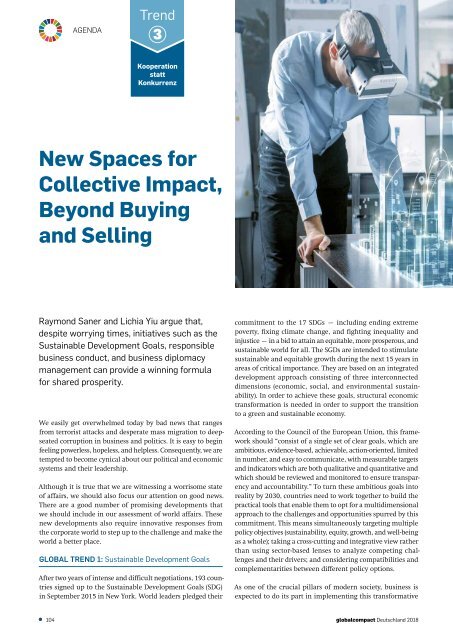Wirtschaft und Menschenrechte - Jahrbuch Global Compact Deutschland 2018
Arbeitsbedingungen, moderne Sklaverei, Einhaltung der Menschenrechte, aber auch Automatisierung, Digitalisierung und Künstliche Intelligenz – das sind zentrale Stichworte für die Arbeitswelt von morgen. Wie begegnen Unternehmen diesen Herausforderungen? Wie übernehmen sie Verantwortung für Menschenrechte und Umwelt in einer ökonomisierten und globalisierten Welt? Welchen Beitrag leisten die nachhaltigen Entwicklungsziele (SDGs) bei der Umsetzung? Diesen Fragen geht das aktuelle Jahrbuch "Global Compact Deutschland 2018" nach. Die Publikation lässt zentrale Akteure aus Wirtschaft, Politik, Forschung und Zivilgesellschaft zu Wort kommen. Darüber hinaus zeigen 25 deutsche Global Compact-Mitgliedsunternehmen in ihren Good Practice-Beispielen, mit welchen Maßnahmen sie zur Erreichung der SDGs beitragen.
Arbeitsbedingungen, moderne Sklaverei, Einhaltung der Menschenrechte, aber auch Automatisierung, Digitalisierung und Künstliche Intelligenz – das sind zentrale Stichworte für die Arbeitswelt von morgen. Wie begegnen Unternehmen diesen Herausforderungen? Wie übernehmen sie Verantwortung für Menschenrechte und Umwelt in einer ökonomisierten und globalisierten Welt? Welchen Beitrag leisten die nachhaltigen Entwicklungsziele (SDGs) bei der Umsetzung?
Diesen Fragen geht das aktuelle Jahrbuch "Global Compact Deutschland 2018" nach. Die Publikation lässt zentrale Akteure aus Wirtschaft, Politik, Forschung und Zivilgesellschaft zu Wort kommen. Darüber hinaus zeigen 25 deutsche Global Compact-Mitgliedsunternehmen in ihren Good Practice-Beispielen, mit welchen Maßnahmen sie zur Erreichung der SDGs beitragen.
Sie wollen auch ein ePaper? Erhöhen Sie die Reichweite Ihrer Titel.
YUMPU macht aus Druck-PDFs automatisch weboptimierte ePaper, die Google liebt.
AGENDA<br />
3<br />
Kooperation<br />
statt<br />
Konkurrenz<br />
New Spaces for<br />
Collective Impact,<br />
Beyond Buying<br />
and Selling<br />
Raymond Saner and Lichia Yiu argue that,<br />
despite worrying times, initiatives such as the<br />
Sustainable Development Goals, responsible<br />
business conduct, and business diplomacy<br />
management can provide a winning formula<br />
for shared prosperity.<br />
We easily get overwhelmed today by bad news that ranges<br />
from terrorist attacks and desperate mass migration to deepseated<br />
corruption in business and politics. It is easy to begin<br />
feeling powerless, hopeless, and helpless. Consequently, we are<br />
tempted to become cynical about our political and economic<br />
systems and their leadership.<br />
Although it is true that we are witnessing a worrisome state<br />
of affairs, we should also focus our attention on good news.<br />
There are a good number of promising developments that<br />
we should include in our assessment of world affairs. These<br />
new developments also require innovative responses from<br />
the corporate world to step up to the challenge and make the<br />
world a better place.<br />
GLOBAL TREND 1: Sustainable Development Goals<br />
After two years of intense and difficult negotiations, 193 countries<br />
signed up to the Sustainable Development Goals (SDG)<br />
in September 2015 in New York. World leaders pledged their<br />
commitment to the 17 SDGs – including ending extreme<br />
poverty, fixing climate change, and fighting inequality and<br />
injustice – in a bid to attain an equitable, more prosperous, and<br />
sustainable world for all. The SGDs are intended to stimulate<br />
sustainable and equitable growth during the next 15 years in<br />
areas of critical importance. They are based on an integrated<br />
development approach consisting of three interconnected<br />
dimensions (economic, social, and environmental sustainability).<br />
In order to achieve these goals, structural economic<br />
transformation is needed in order to support the transition<br />
to a green and sustainable economy.<br />
According to the Council of the European Union, this framework<br />
should “consist of a single set of clear goals, which are<br />
ambitious, evidence-based, achievable, action-oriented, limited<br />
in number, and easy to communicate, with measurable targets<br />
and indicators which are both qualitative and quantitative and<br />
which should be reviewed and monitored to ensure transparency<br />
and accountability.” To turn these ambitious goals into<br />
reality by 2030, countries need to work together to build the<br />
practical tools that enable them to opt for a multidimensional<br />
approach to the challenges and opportunities spurred by this<br />
commitment. This means simultaneously targeting multiple<br />
policy objectives (sustainability, equity, growth, and well-being<br />
as a whole); taking a cross-cutting and integrative view rather<br />
than using sector-based lenses to analyze competing challenges<br />
and their drivers; and considering compatibilities and<br />
complementarities between different policy options.<br />
As one of the crucial pillars of modern society, business is<br />
expected to do its part in implementing this transformative<br />
104 globalcompact <strong>Deutschland</strong> <strong>2018</strong>

















